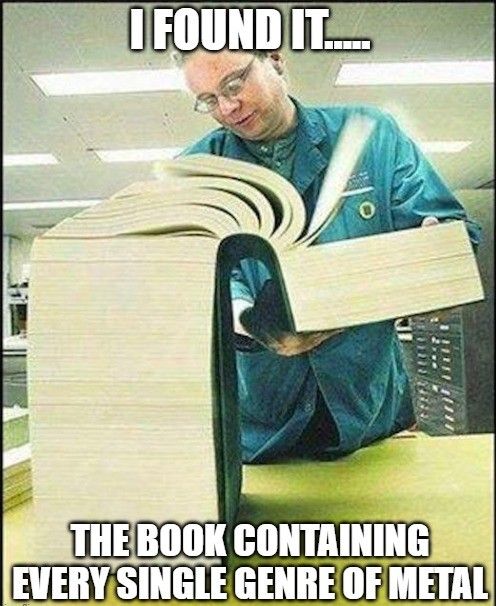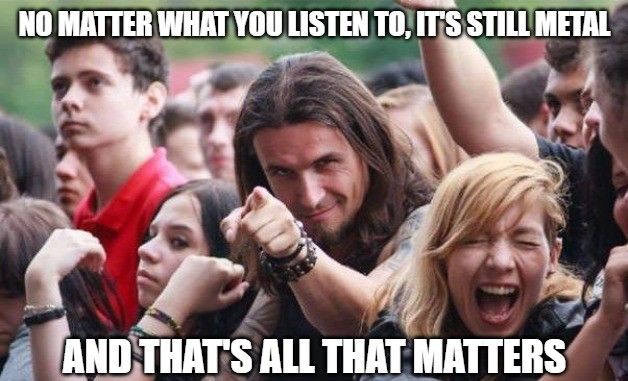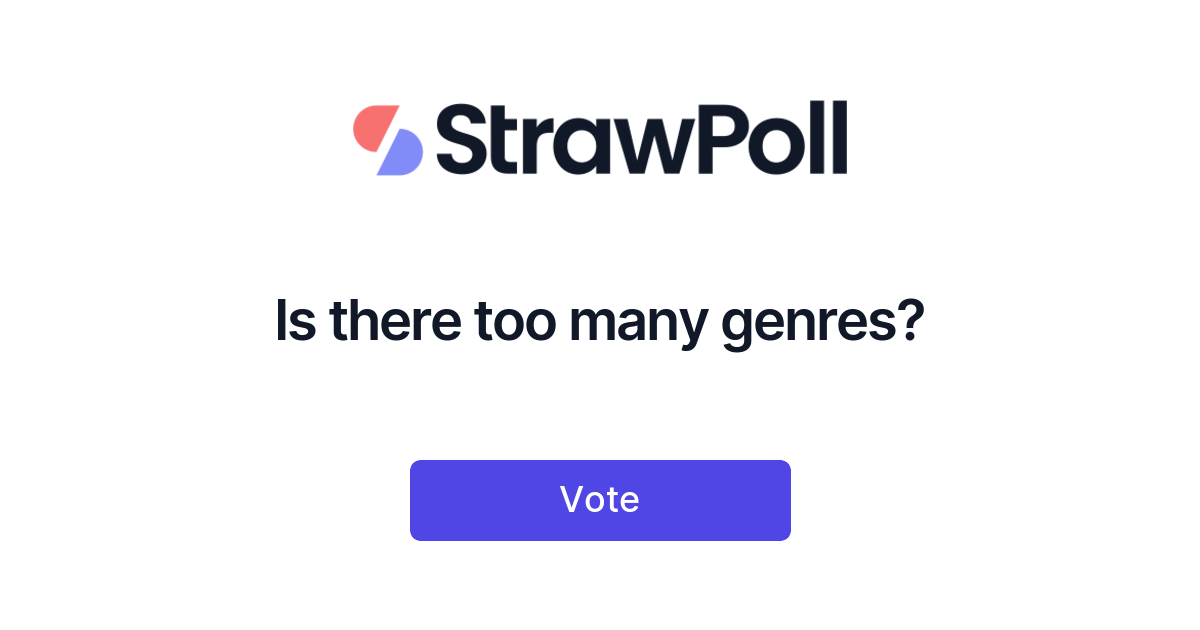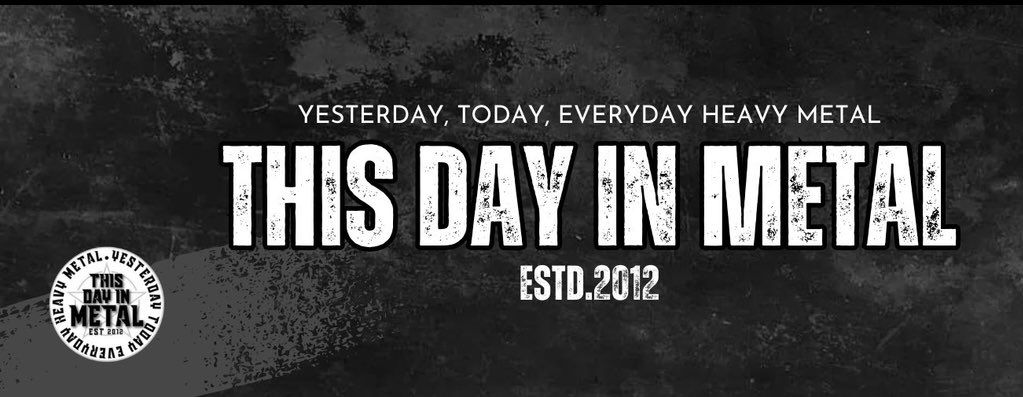Listen To KEVIN DUBROW Singing SCORPIONS “Big City Nights”; One Of His Last Ever Recordings
Kevin Dubrow passed away in 2017 at the age of 52. Kevin was best known as the lead vocalist of

Progressive metal, funk metal, kawaii metal, thall, drone metal, slamming brutal death metal and countless other genres and labels have become the new way to introduce people to a particular style of metal. Or categorize them on playlists and streaming services like Spotify. But is there too many subgenres? Do we really need to have a subgenre or category for ONE band? Is this causing confusion and frustration when a band changes their sound? Putting them into a whole new genre and category that sparks a debate among the fanbase of what sound is the band after (blank) album. Today, I will answer that question.

On this edition of Why The Hate?, I will look into this obsession with labeling and categorizing of heavy metal music. Is it really necessary to have so many different sublabels and genres for heavy metal? Is it wrong to label music under the blanket term of heavy metal? Similar to your grandparents calling every video game related thing "a Nintendo". I will dive into two main genres, black metal and death metal, who seem to have so many subdivisions, variants and categories itself that it is a great example to tackle within this article. I will also show how they are not the only genres affected with the labeling epidemic.
Death metal began in the early 80's. With the popularity of thrash metal acts like Slayer, Metallica and Megadeth, along with the success of Venom's first two albums Welcome To Hell and Black Metal, the origins of proto-death metal were beginning to form. Aiming for a heavier, faster sound, the band Possessed was able to infuse the intensity of thrash metal, while adding deep guttural vocals with their 1985 debut Seven Churches. Another band, coming out of Florida was the other originator of the death metal scene, the band Death. With the band's debut Scream Bloody Gore in 1987, the album, along with Seven Churches, began to form and create the trademark death metal sound and the genre was born. In the 90's, the Florida death metal scene began to surge with popular acts like Deicide, Morbid Angel and Obituary. New York would also feature a rise of death metal legends including Cannibal Corpse and Suffocation. Internationally, death metal would also show a rise in the Scandinavian region of Sweden. Bands like Entombed, Grave, and Unleashed grew in popularity. The formation of the melodic death metal genre began to rise as well. One of the first variants of the genre, the sound was similar to its death metal origins, but would include more harmonized guitar riffs and featured high shrieking vocals, compared to the gutturals of the genre. Popularized and sometimes dubbed "The Gothenburg Sound" with bands like Dark Tranquility, At The Gates and In Flames.
Now we get into the subdivisions that started this whole article idea. Let's start with some of the ones I think many metal fans would agree with. Many bands took the basics of the genre and began to push the genre into new territories. Bands would go simpler on the riffs and slowing the pace down to a more chugging, mid-tempo feel of the guitars, in the veins of Suffocation, creating slam death metal. Bands like Atheist, Opeth and Cynic would infuse progressive elements into their sound, creating progressive death metal. Taking the rise of Norwegian black metal's characteristics, some bands added keyboards and string sections, high screaming vocals, and tremolo guitar playing. The genre of blackened death metal was formed. With acts like Behemoth, Vital Remains, Belphegor and Akercocke leading the charge.
Then we get into the weird and almost unnecessary subgenres. There is the band Necroflex, which is (takes deep breath) dubstep slamming brutal death metal. I do like this record, but I do agree that the genre description is a little over the top. I understand that they want to be different and you want to describe the band's sound to someone who doesn't know the genre or know the band, but if it takes more than three words to describe your band, the genre description is too long. Sometimes simple is better. If you just said electronic or EDM death metal, I would have been fine with that, but all that description is just too much and almost to the point of tedious, repetitive and monotonous.
Other acts like Japan's Babymetal rose to popularity with the release of their 2014 self-titled album. With the cute girl vocals and metal guitar sound, the band would spawn the genre kawaii metal. Kawaii, which is Japanese for cuteness, includes sounds of electronic music, hard rock and bubblegum pop. I am ok with this category because I feel if a band is doing something completely new that hasn't been heard of before, it is justified to have a new genre to describe it. Currently, Wikipedia list ten bands that fit this genre and shows the scene is on the rise, following the rising success of K-pop in the United States.
One of the oddest things I've seen in doing this article was learning of the genre old school death metal (OSDM for short). That death metal has been around for so long, that it's come full circle and renamed its own self. To me, what is the point of that description? Death metal IS death metal. It doesn't need a time frame differential or an age in it's genre description. I will call bands like Mortem, Abscess and Obituary as death metal and NOT old school death metal. Death metal has its offspring in the core genres as well. With the success of melodic death metal, spawned metalcore with bands like Killswitch Engage, As I Lay Dying and All That Remains. Death metal also spawned the most recent punching bag in genres with deathcore. With the genre torchbearers like Suicide Silence, All Shall Perish and Job For A Cowboy, forming what they call "death metal with breakdowns" and challenging the growling capabilities of traditional death metal with the likes of Lorna Shore's Will Ramos and Slaughter To Prevail's Alex Terrible pushing how low and guttural you can go.
The other genre that has almost just as much subdivisions in metal categorization is black metal. Taking the origins of the first wave of black metal from legendary acts like Venom, Bathory, Mercyful Fate and Hellhammer, black metal took the intensity of thrash metal, but felt death metal wasn't heavy enough and too stereotypical and overproduced. Losing its original edge and becoming formulaic. Challenging the heavy Christian culture of the Scandinavian region, the second wave of black metal was formed. Featuring iconic and infamous acts like Mayhem, Burzum, Darkthrone and Gorgoroth, the sound was more aggressive, harsher in it's production sound, going for a more demo, rougher mix compared to the better, cleaner studio production of death metal and metal itself at the time. With heavily anti-Christian lyrics, and high shrieking vocals, the genre began to blossom and rise throughout the 90's. The genre would begin to add symphonic elements and keyboards to the sound, creating symphonic black metal that would rise with the success of acts like Emperor, Dimmu Borgir and Cradle of Filth.
Following that variant, the genre would begin to go into different directions. Rougher, almost hard to listen to, production style was enhanced in the genre of raw black metal, with acts like Darkthrone being one of the innovators and leaders of the genre. Many bands began singing about Viking and Norwegian lore in it's lyrics and band imagery. Creating the Pagan or Viking metal genre, which some have cited Bathory's albums Blood Fire Death and Hammerheart being the origin of the genre's sound and imagery. This genre would unfortunately become a blueprint for the National Socialist black metal genre (some calling it "Nazi Metal" or NSBM for short), promoting the mindset of Nazism and far-right political beliefs in the band's lyrics, album artwork and merch. I will not list examples of this genre since myself nor This Day in Metal will not support that genre or it's ideology in any way.
The genre would also go into a more emotional direction with the subgenres. Depressive suicidal black metal (DSBM for short) tackled more atmospheric music and emotional lyrics, while also delivering the anguishing screams of black metal and production style. Many bands of this genre would be one man bands like Xasthur & Leviathan, who took their inspiration by Burzum, the project of former Mayhem bassist and convicted murderer Varg Vikernes. Along with atmosphere and emotional performances, the genre began to vitalize the popularity of alternative music, specifically "shoegaze", named for guitarists constantly looking at their feet as they use their pedals while playing guitar. Bands like Deafheaven, Alcest and So Hideous took the ambience and space-filling sound of shoegaze, while adding the harsh vocals of black metal, including clean vocals, and mixing them with in-depth and retrospective lyrics regarding relationships and life, creating the genre post-black metal.
These aren't the only genres affected by the subgenre overloading. Progressive metal spawned the heavier, more technical version of itself with djent. Spearheaded by djentmasters Meshuggah, the genre includes syncopated and polyrhythmic 7-8 even 9 string guitars, downtuned chugging breakdown sections, dynamic time signature and tempo changes, and pummeling double bass. It's most recent baby brother is the genre thall. Associated with the band Vildhjarta, it is a variant of djent, but with more dissonant guitar and intricate guitar work. It is very similar to the djent genre that I don't think a new name is needed. The band could be considered a modern day Meshuggah with it's technical prowess, odd time signatures, and heavy breakdowns. But I don't think a new genre needs to be coined, just because they are popular right now is not justifiable.
Doom metal, originated by the likes of Saint Vitus and Candlemass, developed to an even lower tuned, slower tempo and guttural growls to an almost snail's like pace. With acts like Ahab, Evoken and The Funeral Orchestra diving into the murky and downtrodden waters of this genre. Creating an immersive and depressing sounding genre. With songs clocking in at almost a minimum of ten minutes per song, these bands have long albums with very few tracks on them. Forming a dark and horrifying sound in it's minimal performance and reverb, cavernous like sound with their album's production, lyrical themes and overall vast-emptiness in their sound.
Believe it or not, this genre would even become more simplistic and slower tempo then funeral doom ever could. The band Earth would create a genre called drone metal. With very minimalistic music and a repetitive, atmospheric and simple play style, the genre would begin to take a heavier tone with the founding of the band Sunn O))). They would take the minimalism of Earth's sound, but add a wall of distortion, the haunting screaming vocals of Attila Csihar of Mayhem on later releases and live performances. Their sound is an audio experience to be felt live and a band to be seen and heard to feel the intense wall of sound of the band's performance. Some even giving the experience in an almost revelation like atmosphere when the band performs live with smoke, huge wall of speakers and distortion heavy feedback when their songs are performed.
So, after all my rambling and genre mentioning, do all these subgenres and descriptions really need to exist? To a certain degree and level, yes I do think so. Granted yes, there is already way too many to begin with and sort out, but I think some genres and descriptions are needed. I do agree that some simple terms like death metal & black metal do need to exist because they are completely different sounding genres and those basic titles are ok. Making it a simple, easy to describe genre and great starting point for new people wanting to check out that genre of metal. I would even be ok with maybe a three word description (symphonic black metal, progressive death metal, blackened thrash metal for example) would be ok with me. I think once we get into four words or more, it becomes repetitive, not memorable. For new genres like kawaii metal for example, I think a new genre should only be created if it is something completely new, with nothing out there like it, and doesn't need a subvariant (the whole djent/thall discussion earlier).

I am aware, as metalheads, it is hard for us to not have a discussion on what genre a band is, or what to categorize a band to get people into them. Seeing the overwhelming list of genres when working this article, as well as my own knowledge of genres (this article would have been longer if i dived into the 'cores), I see that this is something that will probably never be fine-tuned or genre expelled. Even with a great council of metal leaders discussing the "Is this metal?" or "Does this genre need to be?" arguments, no one will be happy and everyone is entitled to their opinions on what a band is by their definition. As band's develop, change sounds and genres, yes it will make it harder to define who they are or breaking it down into eras of the band. The important take-away from all of this genre listing and debating on whether it is needed, is just interpretation, plain and simple. If it helps you describe a band to someone, and it makes sense to you, then go for it. I am not an elitist, nor do I strive to be one (these people are HEAVILY frowned upon in the metal community).

I just think that sometimes, as metalheads and music fans in general, we can get carried away with the labeling and trying to make our music more unique, or a band trying to stand out from the pack. There might be a band working on brutal symphonic technical Nintendocore right now and it will blow our minds when we hear it. But is all that labeling necessary? No, but then again, to someone else, it might. It might also help the band get some attention, get potentially signed to a label and grow from that success. Who would have thought a band like Napalm Death, who were one of the originators of grindcore, and have the Guinness World Record for shortest song of all time at one second with "You Suffer", would become popular. So, to wrap this up, the whole subgenre/labeling stuff can understandably get some of the hate it does get for new fans and the metal community debating what genre a band is. At the end of the day, it really doesn't deserve all of it. It's up to you as you read this to make your own assumption and opinion, just like I am doing with this series. As long as you are checking out a new band, getting into a genre or rediscovering a band you used to listen to, you're listening to metal.

Do you think there is too many genres in metal? Do you agree with my thoughts on the issues of genres? Let us know in our social media and our Reddit page and vote in the poll below.


What happened on this day in #ROCK #CLASSICROCK #GLAMMETAL #HEAVYMETAL #THRASH history! #TDIM